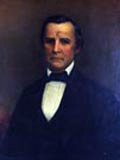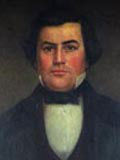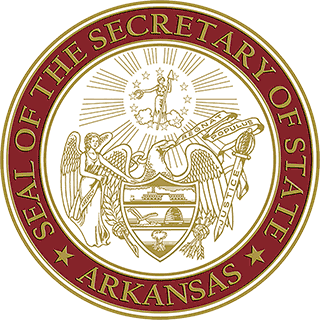State Governors 1836-1852
State Governors 1836-1852
James Sevier Conway
 Born: December 4 1796, in Greene County, Tennessee
Born: December 4 1796, in Greene County, Tennessee
Died: March 3 1855, at Walnut Hill Plantation, Lafayette County, Arkansas
Buried: Family cemetery, Walnut Hill (Conway Cemetery State Historical Park)
Served: 1836-1840
James Sevier Conway arrived in Arkansas in 1820 as a surveyor. In 1823, he bought a farm along the Red River, in what would become Lafayette County. In 1825, Conway was appointed to survey the western boundary of Arkansas from the Red River to the Arkansas River. In 1831, Conway served as Arkansas's commissioner in negotiations with Louisiana setting the states' common boundary. In 1832 when the office of Arkansas Surveyor was created, he was appointed to the post and in 1836 he was elected Governor of Arkansas. As governor, Conway called for internal improvements and public education, supported legislative efforts to create a state banking system and worked to obtain federal protection against Native American raiding on the state's western marches. He successfully lobbied for the establishment of a government arsenal at Little Rock. Numerous controversies connected with the state militia, the proposed state banking system and other issues beset the Conway administration; these, combined with a deteriorating state economy and Conway's ill-health, probably contributed to his decision to not stand for re-election. After serving his one term of four years, he retired to Walnut Hill, his cotton plantation along the Red River. He remained active in politics and civic affairs, helping establish the Lafayette Academy in his home county (1842).
Archibald Yell
 Born: ?1799, in Jefferson County, Tennessee (disputed)
Born: ?1799, in Jefferson County, Tennessee (disputed)
Died: February 23 1847, at Buena Vista, Mexico
Buried: Evergreen Cemetery, Fayetteville (originally buried at Saltillo, Mexico; reinterred at Waxhaws Cemetry, Fayetteville and subsequently removed to Evergreen Cemetery)
Served: 1840-1844
Archibald Yell, Arkansas's second state governor, was probably born in east Tennessee in 1797 or 1799. He served with Andrew Jackson against the Cherokees in 1813-14 and against the British at New Orleans in 1814-15. In Tennessee he read law and was admitted to the bar, but he returned in 1818 to Jackson's army for service against the Seminoles in Florida, where his courage won the admiration of "Old Hickory." Yell served a term in the Tennessee legislature and then received several federal appointments from Jackson, beginning in December 21, 1831, with the directorship of the federal land office in Little Rock. Yell was elected to the House of Representatives when Arkansas was admitted to statehood in 1836 and served until 1839. Yell ran for, and won, the Arkansas governor's seat in 1840. In office, he demanded stronger control of banks but also recommended a board of internal improvements and supported public education. In 1844 Yell resigned in order to run again for Congress. In this campaign he demonstrated that he could be all things to all people. During one morning of the campaign, he won a shooting match, donated the beef to the poorest widow in the community, and ordered a jug of whiskey for the crowd. That same day he led the singing at a camp meeting a few miles up the road. He won the election easily. He served from 1 December, 1845, till 1 July, 1846, when he resigned to join the army in Mexico. He was mustered into the service as colonel of the 1st Arkansas Volunteer Cavalry, and was killed by a Mexican lancer while rallying his demoralized troops at the battle of Buena Vista.
Thomas Stevenson Drew
 Born: August 22(?) 1802, in Wilson County, Tennessee
Born: August 22(?) 1802, in Wilson County, Tennessee
Died: January (n.d.) 1879, at Lapin, Texas
Buried: Pocahontas, Arkansas (reinterred May 30, 1923)
Served: 1844-1849
Thomas S. Drew arrived in Arkansas in 1817, supporting himself by working as a traveling peddler and sometime school teacher. During the 1820s, he became active in politics and postal delivery. An advantageous marriage in 1827 occasioned Drew's entry into farming but he remained active in Democratic Party politics. In 1844, Drew was the consensus candidate of a badly divided party. Elected by a plurality, Drew supported a safe platform of internal improvements, modest aid to education and fiscal conservatism made necessary by the state's failing finances. Drew was re-elected in 1848 without any serious opposition but resigned in January 1849, complaining of the office's low salary. During the 1850s, Drew sought to repair his personal insolvency. He served briefly as Superintendent of Indian Affairs at Fort Smith, before returning to law. Drew suffered financial reverses during and immediately after the Civil War, but resumed the practice of law in the late 1860s in Pocahontas. Following his wife's death in 1872, Drew moved to Texas where he died; his remains were returned to Pocahontas in 1923.
John Selden Roane
 Born: January 8 1817, in Wilson County, Tennessee
Born: January 8 1817, in Wilson County, Tennessee
Died: April 7 1867, at Pine Bluff, Arkansas
Buried: Oakland Cemetery, Little Rock
Served: 1849-1852
Native Tennessean John S. Roane migrated to Arkansas in 1837, studied law and was admitted to the bar that same year. He served as prosecuting attorney for the Second Judicial District from 1840 to 1842, and was a member of the Arkansas House of Representatives from 1842 to 1846. In that year, Roane organized and led a company of volunteers from the Van Buren for the Mexican-American War. Roane's lack of any military experience made him an ineffective commander; at the battle of Buena Vista (February 22-23, 1847) Roane's command performed poorly under fire. After the war's end, criticism of Arkansas regiment (commanded by Archibald Yell, who was succeeded by Roane after Yell's death at Buena Vista) and its performance under fire followed Roane; accusations of incompetence leveled by Albert Pike led to an inconsequential duel between the two political rivals in July of 1847. Due to Governor Thomas S. Drew's resignation in January 1849 a special election was called; on April 19, Roane was elected Arkansas's fourth governor. During his term, both Calhoun and Sebastian counties were created. Roane also advocated programs for internal improvements, and increased funding for education. After a frustrating administration, Roane left office on November 15, 1852, returning to his law practice. During the Civil War, he served as brigadier general in the Confederate army. John Selden Roane died suddenly in April 1867 and is buried at the Oakland Cemetery, Little Rock, Arkansas.



